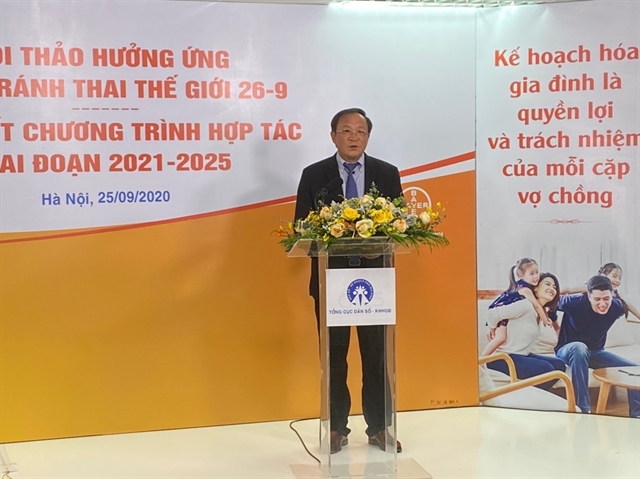 Society
Society


|
| Nguyễn Doãn Tú, Director General of the General Office for Population and Family Planning (GOPFP) of Vietnam delivers the opening speech at “Live your Life, Lead Your Future” campaign commemorating the World Contraception Day. — VNS Photo |
HCM CITY — In three months a short comedy video titled “Rút Không Kịp” by famous artist Huỳnh Lập has attracted 2.5 million views on Youtube.
The nine-minute clip is about family planning and contraceptive methods.
Lập seeks to use humour to educate people about contraceptive methods, and the video has received a lot of positive feedback from viewers.
Easy to understand, easy to remember, feeling relaxed … are among their comments beneath the video.
A young woman from District 7 in HCM City said: “It is so much fun to watch the video. The content is easier to remember than by reading theory. In just nine minutes I learnt something about contraception.”
Lập’s video is one of many efforts to raise awareness among Vietnamese women about family planning, reproductive health, contraceptive methods, and how to avoid unplanned pregnancies.
The video has struck a chord in young people and effectively engages them on how to prevent the consequences of unplanned pregnancies.
In these times, with COVID-19 posing an immediate threat to women’s health and ability to plan their families, raising awareness of family planning is an imperative that all countries in the region including Việt Nam are adopting.
A report from the United Nations Population Fund this year predicted that more than 47 million women could lose access to contraception, leading to seven million unplanned pregnancies.
These have lifelong health and socio-economic impact on women and their families.
Experts said despite the progress made in empowering women’s lives over the last 60 years, barriers still exist today, made worse by the current pandemic.
Many women worldwide are losing access to health and family planning services due to COVID-19 restrictions, and are putting off face-to-face medical consultations due to fear of contracting the virus.
Dr Ashish Bajracharya, deputy director, country strategy & regional representative, South & East Asia, Population Council, said: “As the world responds to the COVID-19 crisis, women’s reproductive health and rights must be carefully safeguarded. We must continue to collaborate, innovate and work to ensure women have access to modern contraception and resources that enable them to make informed decisions about their futures.”
Seeing the risk, governments and other players in the Asia Pacific are co-operating closely to raise awareness of family planning.
Each country in the region has different methods but one aim: helping women access family planning methods and raising their awareness about the issue.
For instance, some countries use telemedicine.
Amid the pandemic, digital platforms offer a new way for women to reach out to their supports and solutions to control family planning.
Telemedicine is fast becoming a safe and convenient option for seeking consultation on health and family planning matters, especially for individuals with COVID-19 safety concerns.
Telemedicine is here to stay in the Asia Pacific, with people expecting to make greater use of digital health services in the next five years.
In Việt Nam, a number of methods have been adopted. In addition to the video by Lập, there is also an online consulting programme that attracts many viewers on fan pages and radio.
The “Tắt Đèn Cài Then” consulting programme provides direct access to psychology and medical professionals for support related to marriage, family, social relationships, and sexual health. Every time it is broadcast, the programme attracts numerous viewers.
In another development, to celebrate World Contraception Day, the Ministry of Health recently organised a live stream which attracted 9,000 views, 124 shares and 81 comments.
Following the success of phase one of the “Family Planning Communication Programme for Public Health” initiative, the General Office for Population and Family Planning and Bayer agreed on a five-year plan for phase two of the programme, from 2021 to 2025.
Bayer also launched the #HerHero campaign across the Asia Pacific including Việt Nam to celebrate everyday heroes such as family, friends, pharmacists, and doctors who provide women with a safe space to talk about such topics, and calls for the wider public to commit to also being ‘HerHero’ to the women in their networks.
“Our commitment to women’s health drives us to empower women to make informed decisions about their health and family planning, with our innovative contraceptive portfolio and digital health initiatives targeted at improving contraception education,” Catherine Donovan, head of medical affairs, Bayer Pharmaceuticals Division, Asia Pacific, said.
“Our new #HerHero campaign, which also commemorates 60 years of the invention of the contraceptive pill, underscores our efforts to safeguard and prioritise women’s health and needs, even during the pandemic.
“By sparking conversations about these issues and celebrating the people that empower women each day, we hope to rally support for women in caring for their health.”
Bayer said it is constantly innovating to find new ways to engage everyday women in taking control of their lives. By developing chatbots in Asian countries with a high unmet need in family planning education, and promoting engagement with the public on social media platforms, Bayer aims to bridge the knowledge gap by offering women easier access to reliable information on contraceptive options and reproductive health. — VNS

.jpg)


